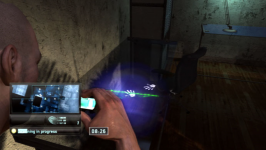How should we investigate in Cyberpunk?
Personally I think witcher senses in TW3 were an effective but overly repetitive system. I think it would be interesting to discuss our ideas for how we can investigate any mysteries that arise within the quests of Cyberpunk 2077. I think it needs to be intuitive and easy to learn, but try to avoid becoming simply push button ... follow trail ... find person / thing you're looking for ... fight or talk ... quest completed.
Your ideas on how to make investigation both intuitive and interesting?
Personally I think witcher senses in TW3 were an effective but overly repetitive system. I think it would be interesting to discuss our ideas for how we can investigate any mysteries that arise within the quests of Cyberpunk 2077. I think it needs to be intuitive and easy to learn, but try to avoid becoming simply push button ... follow trail ... find person / thing you're looking for ... fight or talk ... quest completed.
Your ideas on how to make investigation both intuitive and interesting?





